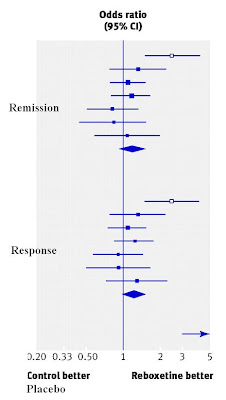According to the BBC, the British recession and spending cuts are making us all depressed.
They found that between 2006 and 2010, prescriptions for SSRI antidepressants rose by 43%. They attribute this to a rise in the rates of depression caused by the financial crisis. OK there are a few caveats, but this is the clear message of an article titled Money woes 'linked to rise in depression'. To get this data they used the Freedom of Information Act.
What they don't do is to provide any of the raw data. So we just have to take their word for it. Maybe someone ought to use the Freedom of Information Act to make them tell us? This is important, because while I'll take the BBC's word about the SSRI rise of 43%, they also say that rates of other antidepressants rose - but they don't say which ones, by how much, or anything else. They don't say how many fell, or stayed flat.
Given which it's impossible to know what to make of this. Here are some alternative explanations:
- This just represents the continuation of the well-known trend, seen in the USA and Europe as well as the UK, for increasing antidepressant use. This is my personal best guess and Ben Goldacre points out that rates rose 36% during the boom years of 2000-2005.
- Depression has not got more common, it's just that it's more likely to be treated. This overlaps with the first theory. Support for this comes from the fact that suicide rates haven't risen - at least not by anywhere near 40%.
- Mental illness is no more likely to be treated, but it's more likely to be treated with antidepressants, as opposed to other drugs. There was, and is, a move to get people off drugs like benzodiazepines, and onto antidepressants. However I suspect this process is largely complete now.
- Total antidepressant use isn't rising but SSRI use is because doctors increasingly prescribe SSRIs over opposed to other drugs. This was another Ben Goldacre suggestion and it is surely a factor although again, I suspect that this process was largely complete by 2007.
- People are more likely to be taking multiple different antidepressants, which would manifest as a rise in prescriptions, even if the total number of users stayed constant. Add-on treatment with mirtazapine and others is becoming more popular.
- People are staying on antidepressants for longer meaning more prescriptions. This might not even mean that they're staying ill for longer, it might just mean that doctors are getting better at convincing people to keep taking them by e.g. prescribing drugs with milder side effects, or by referring people for psychotherapy which could increase use by keeping people "in the system" and taking their medication. This is very likely. I previously blogged about a paper showing that in 1993 to 2005, antidepressant prescriptions rose although rates of depression fell, because of a small rise in the number of people taking them for very long periods.
- Mental illness rates are rising, but it's not depression: it's anxiety, or something else. Entirely plausible since we know that many people taking antidepressants, in the USA, have no diagnosable depression and even no diagnosable psychiatric disorder at all.
- People are relying on the NHS to prescribe them drugs, as opposed to private doctors, because they can't afford to go private. Private medicine in the UK is only a small sector so this is unlikely to account for much but it's the kind of thing you need to think about.
- Rates of depression have risen, but it's nothing to do with the economy, it's something else which happened between 2007 and 2010: the Premiership of Gordon Brown? The assassination of Benazir Bhutto? The discovery of a 2,100 year old Japanese melon?


 05.40
05.40
 wsn
wsn
 Posted in
Posted in 






















